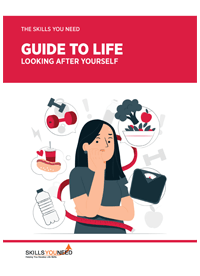The Skills Needed to Overcome Addiction
See also: Self MotivationRecovering from addiction is about more than just finding the right treatment methods; it also takes a lot of work from the inside, so to speak. There’s plenty of information out there about the best options for treatment, but what about the resources someone will need to have within themselves?
The more personal components that are necessary to overcome an addiction are often forgotten. In fact, someone might already have many of the characteristics mentioned below and not even realize it. Simply knowing that they already have some of the tools to begin recovery could help them take the first step, which is why this is a topic worthy of discussion.

Even so, this isn’t to say that the typical advice for breaking out of addiction isn’t helpful either. Structured support programs are vital to keeping newly sober individuals on track, and inpatient treatment centers such as ANR Clinic are meant to help people build new lives as they recover physically and mentally from drug addiction.
Determination
All of these skills are important to achieving a sustainable recovery, but this is one that will make a big difference, especially at the beginning. Simply wanting to get out of the addiction won’t be enough; it isn’t a problem that can be talked away either.
The road to recovery is a long one, but in order to take the first step plenty of determination is needed. It’ll also serve someone well as they continue to fight addictive urges, but without this quality, they probably wouldn’t even be able to start the process.
Self-awareness
It’s hard for anyone to kick addictive behaviors if they can’t identify what’s causing them. If the root causes of the addiction aren’t identified, they’ll keep sending the individual back to the same coping mechanism over and over again. Self-awareness will help them identify the circumstances that made them want to abuse drugs or alcohol in the first place, which is the only way to start overcoming them.
Confidence
Kicking an addiction often means changing one’s entire identity. A coping mechanism that’s powerful enough to take over someone’s life is also powerful enough to define who they are as a person; if they’re going to get rid of it, they need to be confident that they’re capable of making that change – and sustaining it.
Honesty
Denial runs strong in people who are addicted to drugs or alcohol; after all, it’s how they can persuade themselves (and sometimes even their family and friends) that they’re really doing fine. If they stop lying to themselves and others, though, they’ll have less of a “security blanket” that they use to hide from the truth of their addiction. It’ll also help keep them accountable if they ever try to backtrack; if they tell people why they need to make a change, those same people could remind them of their own words if they consider using again.
Consistency
Staying sober can be a minute-by-minute struggle, especially at the beginning of addiction recovery. A slip-up doesn’t negate all the successes before it, but it does mean that the person’s sobriety is at risk. “One last high” or “just one drink” may really be that – or it could be the catalyst for a relapse. Consistency is crucial for getting past an active addiction, since any slip-up could turn into an even worse addiction than before.
Patience
Addiction recovery is a slow process; for some people, the urges never really go away. Anyone who’s in the middle of this process needs patience, not only for the process, but also for themselves. Whatever recovery methods they’re using, they won’t work overnight – just like the individual won’t change overnight. There’s no miracle cure. Addiction recovery takes a lot of time and effort…and patience.
Willingness to seek help
A support network can make a huge difference in getting past addiction, even if it’s just one friend or even an online group. The COVID-19 pandemic has shown that a lack of local support networks and rising addiction rates go hand-in-hand. Couple that with the fact that those who struggle with addiction are often ashamed to admit it, and you have a really tough situation. Willingness to ask for help may not seem like a strength, but it takes a lot of courage for most people to do. Resources such as those provided by the page for detox center in Tucson can offer valuable insights and support on the path to recovery.
Flexibility
On the one hand, it’s important to stick with a treatment plan. On the other hand, it’s also important to recognize when a treatment plan definitely isn’t working and find a new one. This is easy to misuse, though; sometimes a treatment plan doesn’t work simply because the individual isn’t putting the work in. However, there are cases in which the person just isn’t matched with the right treatment, and it’s important to recognize that.
Maintaining realistic expectations
One of the struggles of sobriety is that it’s a lot less entertaining than addiction. A brain that’s used to being gratified by regular “highs” will have a hard time recognizing the benefits of going without, and that could be used as an excuse to leave sobriety behind. If someone knows that they can’t achieve some kind of sobriety nirvana after the first week, though, they’ll be less likely to give up when it doesn’t meet their expectations.
Goals for the future
Leaving an addiction behind isn’t just about moving away from something; it also has to be about moving towards something. Some people get sober for their family members, while others do it because they want a better quality of life. Whatever the case, having clear goals is key for overcoming addiction; it gives a person something to look forward to that won’t have a negative influence on their lives.
Further Reading from Skills You Need
The Skills You Need Guide to Life: Looking After Yourself
Based on some of our most popular content, this eBook will help you to live a happier, healthier and more productive life.
Learn how to look after your body and mind: the fundamental first steps to personal development.
This eBook, now in its third edition, with new and revised content, is designed to make life both easier and better.
The takeaway
Getting past an addiction is a lengthy, multi-faceted process – and a lot of people might be better equipped to do it than they thought. With the right combination of personal attributes, a steady support network, and a well-defined recovery plan, a person struggling with addiction will have a much better chance of overcoming it for good.
About the Author
Lauren is a Texas native who has appreciated the craft of good writing from a young age. If she isn’t working on her latest writing project, she’ll probably be busy sewing, trying a new cheesemaking technique, or fermenting something tasty.


